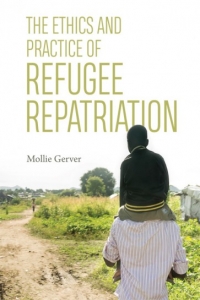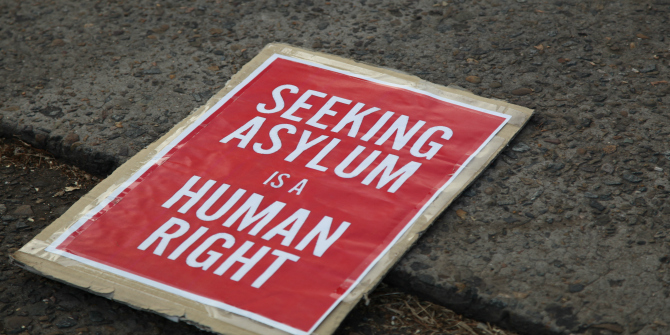In The Ethics and Practice of Refugee Repatriation, Mollie Gerver focuses on the ethical dilemmas of repatriation, exploring a number of key concerns in order to reflect on when and in what circumstances bodies and institutions such as NGOs ought to help refugees to return to their country of origin. This is a precise, policy-focused study, writes Rebecca Buxton, that provides a clear set of guidelines for all those working with refugees and forced migrants who are considering return.
The Ethics and Practice of Refugee Repatriation. Mollie Gerver. Edinburgh University Press. 2018.
With forced migration becoming an increasingly discussed topic in political theory, The Ethics and Practice of Refugee Repatriation by Mollie Gerver offers a deep dive into one of the most morally troubling features of refugee policy: repatriation. Gerver defines repatriation as a refugee’s movement to ‘countries from which they or their parents fled’. This controversial topic has received increased media attention over the last few years. After the 1990s, which the then United Nations High Commissioner for Refugees Sadako Ogata declared ‘the decade of repatriation’, return has become states’ preferred solution to refugee flows around the world. Recently, concerns about the nature of the timing of repatriation have come to the fore with Bangladeshi officials claiming that the return of the Rohingya to Myanmar would begin in September 2019, in spite of the ongoing failure to recognise their rights.
The Ethics and Practice of Refugee Repatriation takes a novel and interesting methodological approach by combining primary fieldwork interviews with analytical political and moral philosophy. Gerver conducted interviews in South Sudan, Ethiopia, Uganda and other countries of origin with individuals who had fled to and then returned from Israel. Interestingly, her focus here is not on the dilemma of repatriation as a global policy initiative, but rather the ethical dilemma faced by those who facilitate repatriation. She therefore aims to provide an answer to the question ‘when is facilitating repatriation wrong?’ Gerver thus offers a clear set of ethical guidelines for NGOs and other institutions working with refugees and forced migrants who are considering returning to their country of origin.
In this excellent book, Gerver tackles seven ethical dilemmas that refugee repatriation facilitators may face: coercion; misinformation; regret; payments; children; discrimination; and restitution. Refugees may be coerced into returning due to policies that make their lives difficult in the state of asylum, such as indefinite detention. Refugees might return due to misinformation when they come to believe that their state of origin has improved sufficiently for them to repatriate – often this is not correct. Refugees sometimes receive payments for returning, particularly from states that want to encourage their repatriation. Refugees also often decide to repatriate with their children even though this might put their lives at risk. Refugees may also face discrimination during the process of repatriation – for instance in Israel, people of African descent are given stipends to return while non-Africans are not. Finally, refugees may be entitled to restitution. That is, they may be entitled to property that they have lost whilst in exile. All of these moral dilemmas, for Gerver, require a rigorous ethical approach.
I will focus here on the two arguments that I found most interesting and relevant to current repatriation practices: coercion and payments.
When discussing the issue of coercion, Gerver outlines a common moral dilemma faced by repatriation facilitators – that refugees often return to their country of origin simply because conditions are so terrible in their country of asylum. Many refugees face destitution and detention in their host state and can wait for years to receive secure legal status. For instance, as Gerver points out, Somali refugees in Kenya are often forcibly encamped and threatened with deportation when they attempt to settle in urban areas. Gerver argues that refugee repatriation facilitators therefore must ask themselves whether they should facilitate repatriation that is chosen to avoid destitution and detention. In other words, should repatriation be facilitated when it is perhaps not a genuine choice in the face of such coercion? Gerver makes the case here that organisations can permissibly facilitate coercion repatriation, but only under three conditions. First, they must try to end the coercion: for instance, by lobbying governments to end forced encampment or detention. Second, they must not contribute to the coercion. And third, they must inform the refugees of the risks of returning.
In Chapter Five, Gerver turns to a similar issue: states who pay refugees to repatriate. One example is Australia’s offer of $20,000 to Rohingya refugees who return to Myanmar. Gerver rightly calls many cash incentives ‘motivation payments’ as they are used to encourage refugees to return home. Gerver argues that such payments can be acceptable if conditions have improved in the state of origin and the individual is well-informed about the risks of returning. Governments that do encourage return with cash incentives should also issue re-entrance visas for those who want to return to the state of asylum. However, she also convincingly argues that we should be worried about ‘negative externalities’ – such payments may reinforce the idea that refugees are unwanted members of society. This chapter of Gerver’s book is extremely interesting and touches on many ethical issues with cash payments that one might not usually consider.
This book offers an excellent example of what philosophers should be attempting to do today. It takes into account real-world policies as well as the attitudes and lives of forced migrants, and does so in a clear and prescriptive way. I did find myself, at times, wondering whether Gerver could have offered a more radical evaluation of the practice of repatriation itself: for instance, by considering its underlying assumption that individuals are best protected through being ‘rooted’ in a state. Such a discussion might have helped to draw out some of the more problematic aspects of the practice of repatriation as dependent upon the idea that people ultimately belong ‘where they came from’.
However, one cannot evaluate a book on what it did not set out to do – Gerver clearly and precisely establishes the scope of this book from the outset and follows through on her promise to the letter. I appreciated and enjoyed this work of policy-focused, clear-headed and well-written philosophy. I hope to read more like it in the future.
Note: This review gives the views of the author, and not the position of the LSE Review of Books blog, or of the London School of Economics.
Image Credit: Former Ivoirian refugees return to Cote D’Ivoire from Liberia, 2016. Photograph by Micah Clemens, USAID (USAID US Agency for International Development CC BY NC 2.0).


 Find this book:
Find this book: 





